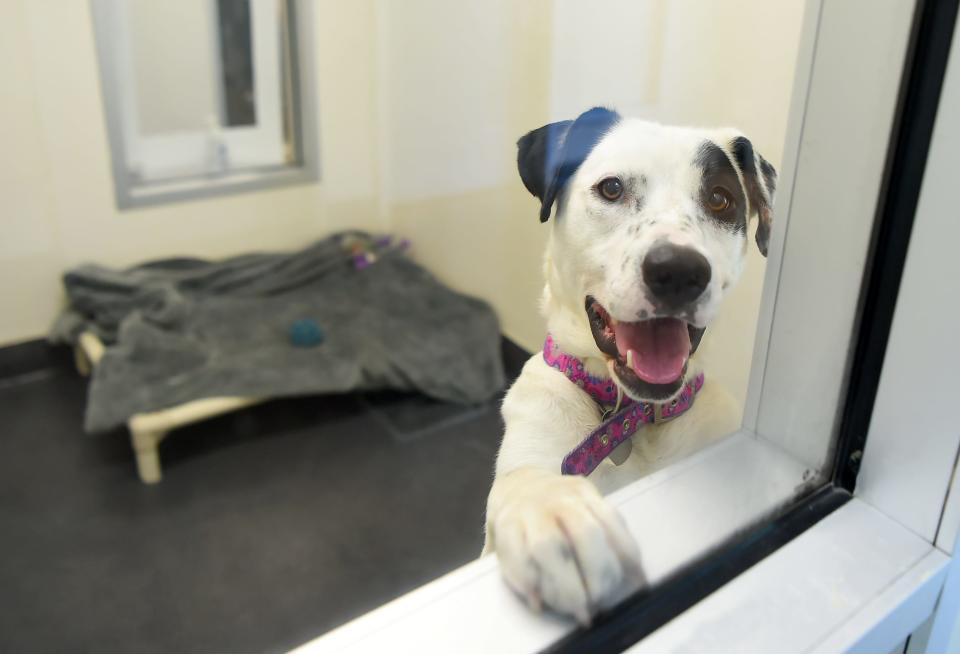UPDATE: NY Puppy Mill Pipeline Bill signed into law by Gov. Hochul
- Oops!Something went wrong.Please try again later.
- Oops!Something went wrong.Please try again later.
UPDATE: On Thursday, Dec. 15, New York Governor Kathy Hochul signed the Puppy Mill Pipeline Bill (S.1130/A.4283) to ban the sale of dogs, cats, and rabbits at retail pet stores. The bill aims to end the puppy mill-to-pet store pipeline and stop abusive commercial breeders. This law will take effect in 2024.
The legislation will also allow NY pet stores that previously sold live dogs, cats and rabbits to charge animal shelters rent to use their space for adoptions.
"Dogs, cats and rabbits across New York deserve loving homes and humane treatment," Hochul said in a statement. "I'm proud to sign this legislation, which will make meaningful steps to cut down on harsh treatment and protect the welfare of animals across the state."
Gov. Kathy Hochul is being urged by celebrities to pass the Puppy Mill Pipeline Bill, which would ban the sale of dogs, cats and rabbits in New York pet stores. Edie Falco, Andy Cohen, Justin Theroux, and Martha Stewart are among the celebrities who signed a letter addressed to the governor earlier this month.
Senate Bill S1130 was sent from New York State Legislature to her office on Monday, nearly two years after it was first introduced. Gov. Hochul has 10 days to sign the bill into law. Pet store owners would have one year to comply with the new law after signing, with violators facing fines up to $1000 per violation.
In a Dec. 1 letter, celebrity pet lovers urged Gov. Hochul sign the bill. The letter, which was also signed by Brooke Shields, Lake Bell, Eric McCormack, and others, included the following statement:

"The puppies currently for sale in New York pet stores arrived in our state through a pipeline of out-of-state breeders and middlemen who ship animals from puppy mills. It’s a cruel and broken system made possible because in New York State, it’s still legal to sell dogs in pet stores....You have the opportunity to break this cycle of cruelty by shutting down the puppy mill pipeline to make it harder for commercial breeders to profit from cruelty, and public support is clear: 8 out of 10 New York residents support the end of pet store dog sales."
At any given time, there are approximately 2,000 puppies for sale in New York State pet stores. Most of the puppies have been transported from out-of-state puppy commercial breeding operations, commonly referred to as "puppy mills." In 2021 alone, there were approximately 25,000 puppies from puppy mills brought into the state.
"The actual number is likely much higher," said Bill Ketzer, ASPCA's Senior Director of State Legislation, Eastern Division.
Puppy Mill Pipeline Bill:New York state lawmakers pass Puppy Mill Pipeline Bill. What it means
For subscribers:Will killer in racist Buffalo massacre still face execution for federal crimes?
News:French official says St. John Fisher student's disappearance is 'worrying'
Ketzer said the Puppy Mill Pipeline law is necessary to ensure animal welfare because most of the puppies come from Midwest states, particularly Iowa and Missouri. New York has no jurisdiction to inspect for inhumane conditions in out-of-state commercial breeding. He stated that even if commercial breeding operations are inspected by the United States Department of Agriculture (USDA), violations of the federal Animal Welfare Act are rarely enforced.
"We know that New York State currently has no ability to control the types of cruelty that we've seen within these facilities," said Ketzer.
The ASPCA recently obtained documentation from the USDA and Iowa Department of Agriculture that detailed the inhumane conditions in an Iowa puppy mill owned by Henry Sommers. A notorious puppy supplier, Sommers recently shipped puppies to two New York pet stores, Teacup Pup and Astoria Pets, both located in Queens.
The documentation, including video footage and photos, was obtained by the ASPCA through a Freedom of Information Act (FOIA) request. The documented findings included:
Reports from 2014 through 2022 detail a failure to seek medical treatment for dogs. Many violations were considered serious or life-threatening.
Documents show Sommers possessed controlled substances that he used to sedate or euthanize dogs himself, without authorization or recommendation of a veterinarian. Reports suggest Sommers may be killing his dogs in a manner likely to inflict prolonged and painful death.
Sommers had repeated violations for inadequate, unsanitary, and dangerous housing. Dogs were kept in enclosures that were too small, have exposed, pointed wires and flooring that allows dogs’ feet to be trapped.
The Puppy Mill Pipeline Bill was first introduced to state lawmakers in January 2021 by Senate Deputy Majority Leader Michael Gianaris (D, WF-Queens) and co-sponsored by Assembly member Linda B. Rosenthal (D/WF-Manhattan). S.1130 was passed with bipartisan support by the Senate in May 2022 and by the Assembly in June 2022.
"We know that the governor cares about animals," said Ketzer. "We urge her to sign this bill."
Follow Kate Collins on Twitter: @kcollins213. To get unlimited access to the latest news, please subscribe or activate your digital account today.
This article originally appeared on Ithaca Journal: New York Puppy Mill Pipeline Bill moves forward: What to know

